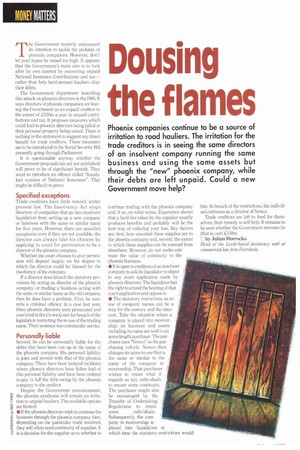Dousing the flames
Page 52

If you've noticed an error in this article please click here to report it so we can fix it.
Phoenix companies continue to be a source of irritation to road hauliers. The irritation for the trade creditors is in seeing the same directors of an insolvent company running the same business and using the same assets but through the "new" phoenix company, while their debts are left unpaid. Could a new Government move help?
The Government recently announced its intention to tackle the problem of phoenix companies. However, don't let your hopes be raised too high. It appears that the Government's main aim is to look after its own interest by recovering unpaid National Insurance Contributions and tax— rather than help hard-pressed hauliers clear their debts.
The Government department launching this attack on phoenix directors is the DSS. It says directors of phoenix companies are leaving the Government as an unpaid creditor to the extent of L150m a year in unpaid contributions and tax. It proposes measures which could lead to phoenix directors being jailed or their personal property being seized. There is nothing in the statement to suggest any direct benefit for trade creditors. These measures are lobe introduced in the Social Security Bill presently going through Parliament.
It is questionable anyway whether the Government proposals (as yet not published) will prove to be of significant benefit. They want to introduce an offence called "fraudulent evasion of National Insurance". That might be difficult to prove.
Specified exceptions
Trade creditors have little remedy under present law. The Insolvency Act stops directors of companies that go into insolvent liquidation from setting up a new company or business with the same or similar name for five years. However, there are specified exceptions; even if they are not available, the director can always take his chances by applying to court for permission to be a director of the phoenix company.
Whether the court chooses to give permission will depend largely on the degree to which the director could be blamed for the insolvency of the company.
If a director does breach the statutory provisions by acting as director of the phoenix company, or trading a business acting with the same or similar name as the old company, then he does have a problem. First, he commits a criminal offence; in a case last year, three phoenix directors were prosecuted and convicted in the Crown Court for breach of the legislation restricting the re-use of the trading name. Their sentence was community service.
Personally liable
Second, he can be personally liable for the debts that have been run up in the name of the phoenix company. His personal liability is joint and several with that of the phoenix company. There have been isolated incidents where phoenix directors have fallen foul of this personal liability and have been ordered to pay in full the debt owing by the phoenix company to the creditor.
Despite the Government announcement. the phoenix syndrome will remain an irritation to unpaid hauliers. The available options are limited: • If the phoenix directors wish to continue the business through the phoenix company then, depending on the particular trade involved, they will often need continuity of supplies. It is a decision for the supplier as to whether to continue trading with the phoenix company and, if so, on what terms. Experience shows that a hard line taken by the supplier usually produces benefits and probably will be the best way of reducing your loss. Key factors are: first, how essential these supplies are to the phoenix company and, second, the extent to which these supplies can be sourced from elsewhere. However, do not under-estimate the value of continuity to the phoenix business.
• It is open to creditors of an insolvent company to ask its liquidator to object to any court application made by phoenix directors. The liquidator has the right to attend the hearing of that court application and oppose it.
• The statutory restrictions on reuse of company names can be a : trap for the unwary and the innocent. Take the situation where a company is placed into receivership; its business and assets including its name are sold to an arms-length purchaser. The purchaser uses "Newco" as the pur chasing vehicle. Newco then changes its name to one that is
the same or similar to the name of the company in receivership. That purchaser wishes to retain what it regards as key individuals to ensure some continuity. The purchaser might also be encouraged by the Transfer of Undertaking : Regulations to retain some
Subsequently, the company in receivership is placed into liquidation at which time the statutory restrictions would bite. In breach of the restrictions, the individual continues as a director of Newco.
Trade creditors are left to fend for themselves; their remedy is self-help. It remains to be seen whether the Government recovers its (that is, our) £150m.
E, by Julian Horrocks
Head of the Leeds-based insolvency unit at commercial law firm Eversheds.




































































































































